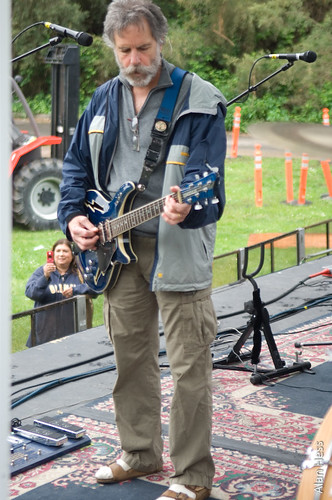The Book of the Dead
Paul Liberatore
EVEN THOUGH rock 'n' roll is over 50 years old, middle-aged and no longer the exclusive music of youth and rebellion, the notion of a rock 'n' roll librarian still sounds like an oxymoron, a contradiction in terms. But not to David Dodd.
The head librarian for the city of San Rafael, Dodd is a serious rock scholar, specifically a Deadhead of long standing with three books on the Grateful Dead to his credit.
His newest, "The Complete Annotated Grateful Dead Lyrics," has just been published in a beautifully illustrated and meticulously researched hardcover edition by Free Press, an imprint of Simon & Schuster. It will be in stores Oct. 24.
For Dodd, the Three Rs are rock, reading and research.
"Part of this is totally librarianly," he said, discussing his book one morning this week in his windowless office in the depths of the San Rafael Library.
"I'm interested in seeing people read, in seeing people take whatever they're interested in, whether it's rock 'n' roll or art or mechanical engineering, and going from that and reading and becoming a well-rounded human being."
With their reputation for mind expansion, the Grateful Dead have always attracted intellectuals, thinkers, spiritual seekers, autodidacts and nerds of every stripe.
With the highly literate Robert Hunter as their "lyricist in residence," and with intelligent contributions from lyricists John Barlow and the late poet Bobby Petersen, Jerry Garcia and company built a sophisticated catalog of songs brimming with literary allusions, historical references, cultural citations, biblical passages and assorted arcana.
Hunter, a longtime Marin resident, wrote the book's extensive foreword, noting that the "verbal and musical complexity" of the work he did with the Dead was "shockingly innovative" in its day, as was the band's blending of "rock 'n' roll, jazz and traditional folk culture."
"The point is that Robert Hunter is a post-modern poet who takes fragments that he inherited from other sources and melds them into new stories," explained Dennis McNally, the Grateful Dead's historian and publicist. "What David Dodd has done is the detective work in tracing where those fragments came from."
At 48, balding, bearded and bespectacled, Dodd looks like just the man for the job, a rock fan more at home with a book in his hands than a backstage pass around his neck.
"I'm a reference librarian," he said proudly. "I like tracking facts down. It's what I do for a living. It's a blast."
Of all the scores of songs he researched, his biggest challenge was the Hunter/Garcia composition "China Cat Sunflower."
"The lyric itself is so opaque as to be almost completely uninterpretable," he remarked.
But not entirely. For instance, Dodd was able to pick out the word "bodhi" in one verse and inform us that it's Sanskrit for "enlightenment." A reference to "Krazy Kat" notes a cartoon character in a daily newspaper strip that ran from 1913 to 1944.
And he unearthed an interview with Hunter in which he revealed that the obscure English poet Dame Edith Sitwell was the inspiration for the song's last line, "in the eagle wing palace of the Queen Chinee."
As he mentioned Sitwell, Dodd grabbed an old copy of her novel, "I Live Under a Black Sun," a castoff from Stanford University's library.
He pointed out the title's striking similarity to the title of the Dead song "Dark Star," and that Sitwell's book is a novelization of a poem by Jonathan Swift about his lover, Stella, a fact Dodd included in his extensive annotation of the Hunter/Garcia song "Stella Blue."
"This is one book that's got three connections to the Grateful Dead that no one would ever think of," he said, chuckling with obvious delight. "I love it."
Deadheads can't get enough of this kind of stuff, even if the connections may be more coincidence than cosmic. Or are they?
"I'm enough of a Deadhead to know that there are things at play here that are bigger than any of us," Dodd said.
In October 1976, when he was a college student at the University of California at Davis, Dodd got turned on to the Grateful Dead inadvertently when he went to see the Who at a Day on the Green concert at the Oakland Coliseum.
"The Dead were the opening act," he recalled. "I love the Who, but the Dead totally blew me out of the water. It was so impressive to see a band that was mostly concerned with the music. There were no histrionics. They were just standing there stolidly playing. It was kind of different than anything I'd seen. That was the start of it for me. After that, I went to every concert I could get to for the next 20 years."
During that time, he compiled the books "The Grateful Dead and the Deadheads: An Annotated Bibliography," and co-edited "The Grateful Dead Reader" with his wife, Diana Spaulding.
A decade ago, Dodd launched a Web site devoted to the annotation of Grateful Dead lyrics that included contributions from fans. The new book emerged from that online project.
Coming out as the band celebrates its 40th anniversary, "The Complete Annotated Grateful Dead Lyrics" includes notes on when songs were written, recorded and first performed. It contains 200 illustrations by Eugene, Ore., artist Jim Carpenter, and was co-edited by Alan Trist, steward of the Grateful Dead's publishing company, Ice Nine.
"It didn't surprise me that David would dig up so much stuff," Trist said. "But it's going to surprise Deadheads who weren't familiar with the references that he's picked up on. It's all over the place, and that's what makes it so interesting."
3 days ago






